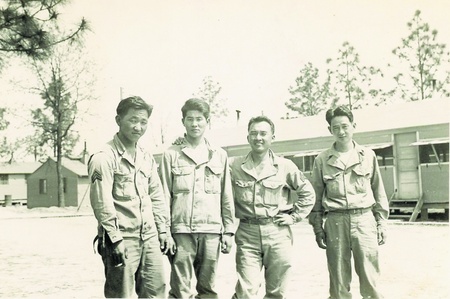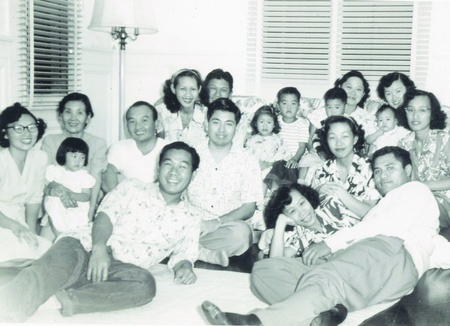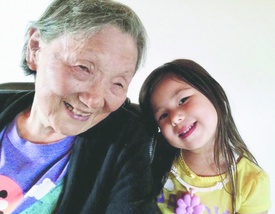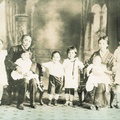Sally’s earliest memories are of playing with Bernice and Beatrice Wong in back of the grocery store their parents owned. But the girls’ friendship was undermined by the prevailing cultural norms at school. “Because this was during a time when the Chinese would stay with the Chinese, the Japanese with the Japanese in school, and you didn’t integrate,” Sally recalls. “It was terrible.”
It was worse for her older sister, Elizabeth, whom classmates taunted for being deaf. Sally tried to protect her sister but the children still felt the stigma of being both poor and fatherless. But some tried to help the family. Dr. Lightner, who’d tended the injured at the scene of the accident, quietly gave the family the medicine they couldn’t afford. And when Sumi lacked money for groceries, the proprietor at Ichiki Store allowed her to shop on credit.
Sally’s best friend in fifth grade was Fujiko Katsutani, who rose to fame in Soichi Sakamoto’s Three-Year Swim Club. In 1937, Coach Sakamoto began training a crop of scrappy plantation kids to compete in the 1940 Olympics. Sally, who often accompanied Fujiko to swim practice, recalls that while Sakamoto was very strict, “everyone listened to him because whatever he said was the law.”
His demanding regimen paid off. In 1940, 14-year-old Fujiko won the 200-meter breaststroke in the AAU National Championships, which qualified her for the Olympics. But her dreams were dashed when the games were canceled due to WWII.
For Sumi, education was key to improving her children’s lives. After the accident, 13-year-old Doris went to work to help the family, but Sumi urged the younger ones to pursue the education she was denied. When they lived in ‘Īao, Molly and James trekked in slippers down the valley and across ‘Īao stream to Wailuku Elementary, more than three miles away. “In those days there was no bridge so if the river was high, they couldn’t go to school,” Sally recalls.
In high school, the siblings woke before dawn to hop on the 6 a.m. train to Hāmākuapoko, from where they’d walk to Maui High School. Molly was especially bright. Her essay on Camp Pokuelani was published by American Girl Magazine, foreshadowing her career as an English teacher and playwright. James represented Maui in a statewide oratory contest and set his sights on attending the University of Hawai‘i.
Although Hawai‘i was spared the worst effects of the Great Depression, its economy still struggled to rebound. One by one, the older children moved to O‘ahu for higher education and jobs. In 1937, Sumi, Elizabeth and Sally joined the rest of the family in Honolulu.
Twelve-year-old Sally was enraptured by her new home. “Everywhere, they sold ice cream and shave ice, two for five cents. So Baban always gave us a nickel and Lizzie and I had ice cream or shave ice every day,” she laughs. “We were so happy. I loved it.”
Sumi, like her husband, tailored herself to the job market. When she learned that house cleaners were in demand, she became one. For $8 a day, six days a week, she polished a host of spacious, elegant homes in Kahala while her own family squeezed into a one-bedroom rental in Kalihi.
On the morning of Dec. 7, 1941, Sally was walking to church when she saw clouds of smoke billowing up from west O‘ahu. At church, the pastor ordered everyone home: Japanese planes had just bombed Pearl Harbor. James, who’d joined the Army six months earlier, raced out to report for duty at Schofield Barracks. Sumi stood frozen at the kitchen counter, crying, fearful that her family was again being torn apart. She felt the same shock from 15 years earlier when the terrible accident suddenly wrenched Mitsuzo, Fusae, and Yachiyo from her. Now, her only son was heading to war.

The Territory of Hawai‘i imposed martial law and anti-Japanese sentiment engulfed the islands. The FBI arrested prominent leaders in the Japanese community, imprisoning them within barbed-wire enclosures at Honouliuli and other camps.
Despite the discrimination, James and his fellow Army recruits continued to train and prove their skills as good soldiers and loyal Americans. While with the 100th Infantry Battalion (Separate) at Camp McCoy in Wisconsin and at Camp Shelby in Mississippi, he forged an enduring friendship with Takashi Kitaoka, who later became the first Maui-born judge on the Maui County circuit.
Fighting in Scapoli, Italy, James was hit and wounded by machine gun fire when “he reorganized his platoon after its leader fell, and led the men across 300 yards of open terrain under intense artillery fire.” Staff sergeant James F. Tani received the Purple Heart and Bronze Star for his actions, one of the many heroic acts that made the 100th Infantry Battalion and 442nd Regimental Combat Team among the most decorated units of WWII.
Sumi was relieved to welcome her son home, when so many other soldiers had not come back. James enrolled in the University of Hawai‘i under the G.I. Bill, and was elected vice-president of its G.I. Association. At one meeting, he voiced concern that local girls seemed to prefer dating “Mainland” soldiers. An island girl, he argued, “won’t go out with a five-foot, five-inch islander any more, she has to have a six-foot mainlander.”
Yet one girl had caught his eye. The veterans hung out at the campus bookstore, where a spirited Chinese-Hawaiian student, Carolyn Sau Kai Loo, ran the cash register. James asked her out on a date to Waikīkī and, at evening’s end, stunned her with a proposal of marriage. In 1948, James and Carolyn married at Church of the Crossroads in Honolulu. He was attired smartly in a white tuxedo while she wore a borrowed wedding gown.
Sally, Molly and James all graduated from UH. Sally, after receiving her degree in nursing, married Clifford Kuba, a classmate from McKinley High School. Doris and Molly were raising families of their own.
A photo from that period shows the Tani and Loo families gathered amid a modest living room. Sumi sits on the floor, cradling a granddaughter in her lap. She’s smiling, enjoying the ebullient mood, as James and Sally sit beside her, laughing. More than two decades earlier, she had held baby Yachiyo in her lap in the same way.

The ache of that loss would never go away but it had dulled over the years. Now, having retired, she could simply enjoy her grandchildren. She shared her love of kokeshi dolls with the little girls and took the older ones to watch Japanese films at Toyo Theater.
Sumi lived with her daughter and son-in-law, Elizabeth and Charles Tanaka, both of whom were deaf. Recalling her early experiences of being bullied at school, Elizabeth, with her husband, established an endowed fund at Kapi‘olani Community College that supports programs for its deaf and hard-of-hearing students.
Sumi’s grandchildren on Maui also have embraced an ethos of public service. Susan Kuba Scofield, Sally’s eldest daughter, served for 20 years as principal of King Kekaulike High School in Pukalani. In 2013, under her leadership, U.S. News & World Report ranked the school among the top public high schools in Hawai‘i.
Kenson Kuba, Sally’s son, retired after 20 years as a water microbiologist for the County of Maui Department of Water Supply. Carson Tani, James’s middle son, is a 30-year veteran of the Maui Prosecutor’s Office who’s tried some of their toughest cases.
In 1950, Sumi traveled to see her ailing brother in Yanai, her only journey back to Japan. Her parents had passed away by then and she regretted not coming back sooner to see them. She stopped by the temple where Mitsuzo, his father and two brothers once served as priests. From this sacred place, more than a half century earlier, Mitsuzo launched his quest for a new life in a foreign land. When Sumi joined him in Hawai‘i, leaving behind the only world she’d ever known, she discovered neither the magical “paradaisu” nor the youthful husband she envisioned. But she persevered and they built a family.
After Mitsuzo died, Sumi often longed to know what he would have told her to do. But as time passed, the sound of his voice and the image of his face receded. She endured on her own. She raised her children and they made Hawai‘i their home. That was her fortune.
Sumi Matsumoto Tani died on April 19, 1984, in Honolulu, at age 91. In succeeding years the Tani family would come to include 12 grandchildren, 20 great-grandchildren and 11 great-great-grandchildren, living across Hawai‘i and the U.S. West Coast. She and Mitsuzo, along with their daughters, Yachiyo, Fusae, and Molly are interred alongside one another, with Elizabeth and her husband nearby, at Nu‘uanu Cemetery on O‘ahu, next to the sacred burial ground of Mauna Ala.
* This article was originally published in The Hawaii Herald on July 15, 2022.
© 2022 Carlyn Leinani Tani




